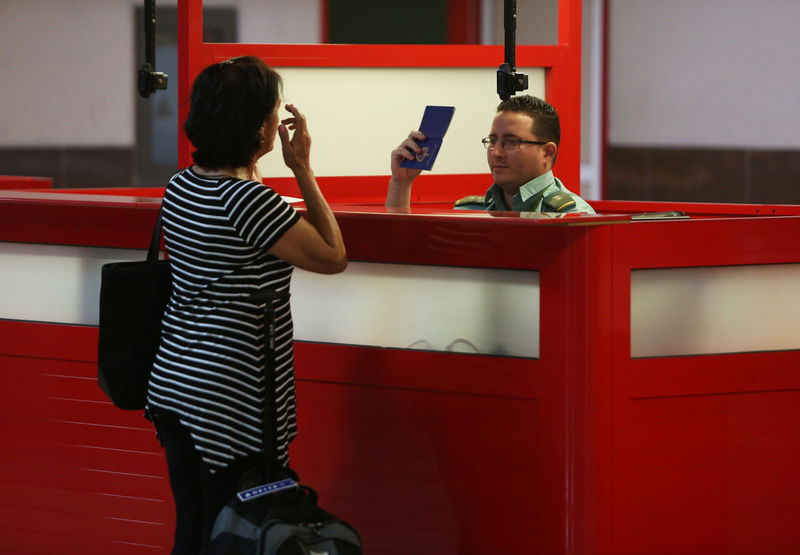By Daniel Trotta and Sarah Marsh
HAVANA (Reuters) - Cuba and the United States have dramatically reduced the rate of human trafficking since reaching a landmark accord in January but risk losing those gains if the two neighbours fail to resume high-level talks, Cuban Interior Ministry officials said in an exclusive interview.
During bilateral talks in the final days of former U.S. President Barack Obama's administration, the United States agreed on Jan. 12 to end a longstanding policy of admitting Cubans who set foot on U.S. soil, a move aimed at discouraging them from taking a dangerous voyage on the high seas.
The "wet foot, dry foot" policy was one example of the special welcome the U.S. government extended to Cubans as it sought to isolate the island's Communist government, and its repeal marked the culmination of Obama's rapprochement with America's former Cold War rival.
Since President Donald Trump assumed power on Jan. 20 with promises to review the detente, high-level bilateral talks have ground to a halt. In the meantime, smuggling rings have been trying to reorganize and consolidate, Cuban officials said, seeking new ways to sneak Cubans and other foreign nationals into the United States.
Although U.S. and Cuban law enforcement agencies maintain direct communications with each other, the high-level talks are essential, the Cubans say.
"It's of great importance for both countries because the security of both is put at risk," Lieutenant Colonel Dalgys Lamorut said. "Cooperation is important to safeguard the advances we have made."
Lamorut, representing the immigration directorate, and two other lieutenant colonels in the Interior Ministry, representing the police and coast guard, spoke to Reuters on Wednesday in a rare opening to the foreign media, limiting their comments to human trafficking and immigration fraud.
The interview took place as the Trump administration nears completion of a policy review to determine how far it will go in rolling back Obama's engagement with Cuba, according to current and former U.S. officials and people familiar with the discussions. The announcement of any policy change could come in June, they said. Trump, a Republican, has been critical of the move by his Democratic predecessor on the grounds it did not push Cuba hard enough on human rights issues.
At a meeting of senior officials from major U.S. government agencies in mid-May, Justice Department and immigration service officials were among those who expressed support for continuing law enforcement engagement implemented under Obama's rapprochement, according to people familiar with the discussions. However, Trump's senior national security aides have yet to take up the issue in detail, the sources said.
Bilateral talks enable multiple agencies from both sides to coordinate and update strategies against criminal organizations, said Lieutenant Colonel Marco Rodriguez, representing Cuban police.
"These organizations are not going to cease their criminal activity, which undoubtedly is going to involve Cuba and the United States," Rodriguez said.
"Together we can continue neutralizing these structures," he said.
SHARP DROP IN TRAFFICKING
The Cuba officials said the smuggling of illegal immigrants had dropped remarkably since Jan. 12, the day the United States ended the "wet foot, dry foot" policy.
In the first 12 days of this year, Cuba intercepted 69 plots to smuggle people off the island, but there were only 44 such cases in the following three and a half months, Rodriguez said.
The U.S. Coast Guard reported zero detention of Cubans at sea in April, the first month in seven years that has happened. It is just 90 miles (145 km) from Cuba to Key West, Florida, and tens of thousands of Cubans, if not more, have made the journey since Cuba's 1959 revolution.
Cuba describes human trafficking as the work of paid smugglers in organised criminal gangs, distinguishing it from cases of Cubans attempting to leave on their own in home-made rafts. It also considers the forced trafficking of people for sexual exploitation a separate category.
The Cuban officials also revealed a host of other previously unreported statistics.
Since 2013, officials have stopped 1,153 Cubans attempting to reach the United States with false visas or travel documents, Lamorut said.
In 2015 and 2016 alone, she said, on 23 occasions Cuba stopped a total of 86 foreigners trying to enter the United States via illegal voyages from Cuban territory, but none since Jan. 12 of this year.
From 2010 to 2017, Cuba detained 182 traffickers including four U.S. citizens in Cuban territory, confiscating 83 speed boats, said Lieutenant Colonel Imandra Oceguera, representing the Cuban coast guard.

During that time 49 died while being smuggled, including 30 from one launch last year, Oceguera said.